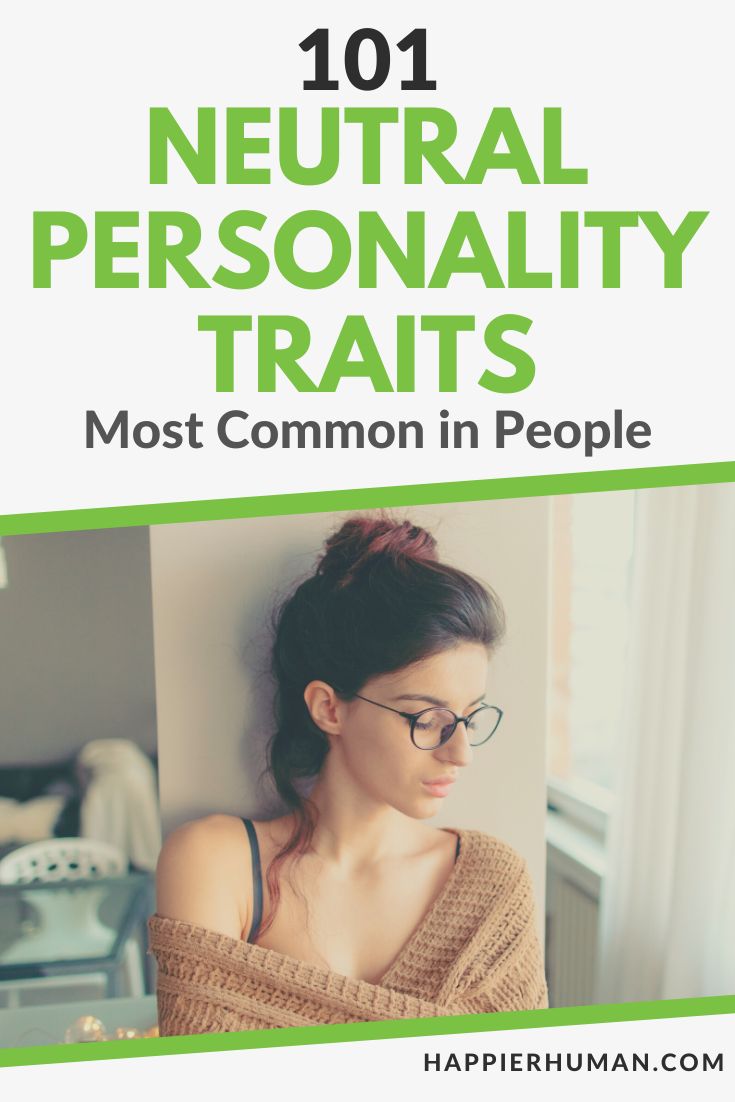Are you like the Grinch? If you have neutral personality traits, you probably are similar. The green icon of the holiday season exhibits both a love of solitude and celebrity with crowds at the same time.
The Grinch is a calm, focused genius and a dynamic, forceful, and spirited guy. He may seem cold-hearted and cruel, but he is actually a warm, fun-loving, and caring character. The Grinch is a strolling bundle of contradictions.
This article will define and explain a neutral personality, how personality traits differ from character traits, and the contradictions they hold. I’ll also present examples of neutral personality traits and outline the downsides and benefits of having them. Finally, I’ll give you resources to help you change or polish your personality traits to be the best possible version of yourself.
What is a Neutral Personality?
A neutral personality is a complex, confusing, and contradictory personality type that is both introverted and extroverted, indifferent in the social sphere. It can be calm and exuberant at the same time.
Neutral personality traits are neither positive nor negative. However, they can lean toward good or bad depending on context, circumstance, and self-awareness. For instance, a quiet or passive personality trait may be seen as either fearful and timid or wise, strong, and intelligent.
The perception others adopt depends on the actions and context accompanying the neutral trait.
Other people may view those with neutral personalities as undecided, weak, or straddling the fence on virtually everything. As social creatures, we judge others we meet based on impressions. It’s a natural tendency.
Let’s examine this fine-tuned personality masterpiece to understand further how it operates.
How Character Traits Are Different from Personality Traits
Character and personality traits are vastly different but also dependent on one another. It takes a team to make things work, and it is no different with the characteristics that make you who you are.
Character and personality are like the Antikythera Mechanism, an ancient Greek gear-powered astrology computer from the 2nd Century BC. It is a complicated device with multiple bronze gears and dials that had to work meticulously together to function.
People with neutral personalities are very similar to this device in how they think, behave, and function. It is complex and yet stunningly brilliant.
Character traits are your essence. They stem from your core beliefs like moral, ethical, or social ideas. These core beliefs cause you to act or behave a certain way in certain circumstances. Even though they shape your personality, they are also influenced by them.
Examples include:
- Integrity
- Honesty
- Generosity
- Morality
Personality traits are how you communicate your essence. They are more of a complex blend of temperament and character aspects. They involve the inherent characteristics of the operating system you were born with and are formed according to your character traits.
Examples include:
- Neurotic syndromes
- Extraversion
- Introversion
- Social adaptability or lack of it
Let’s look at the biggest obstacle in understanding neutral individuals: contradictions.
Understanding the Contradictions in Neutral Personality Traits
One of the most challenging things to understand about neutral personalities is their seemingly unresolved contradictions. To the neutral person, it all makes perfect sense. To others, they seem strange, quirky, and unable to stick with one focus.
While other personality types lean one way or another, neutral persons are like an ambidextrous octopus, juggling balance and evenness on all its arms. It drives others crazy because they don’t understand it. To the neutral person, it flows with ease.
These are a few examples:
- They are friendly and polite but straightforward, direct, and outspoken when they recognize a better way to do things.
- To others, their forwardness feels like an attack, but the attack is only on the problem, not other people.
- They find solutions within the box and outside the box at the same time.
- They are calm and laser-focused on one hand and vigorous and spirited on the other hand.
- Neutral personalities love work as much as play.
- They can be both an introvert and extrovert at the same time.
- They have childlike naivety and super intelligent ideas all in one personality package.
- They are proud yet humble, never leaving others behind on the praise and glory.
Now that you understand neutral personality traits and how they work, let’s check out a list of these most common traits.
101 Neutral Personality Traits Most Common in People
A person with neutral personality traits is an amazing work of wonder and awe. Whether you are a fantastic neutral individual or know someone who is, understanding the traits is crucial.
These special folks have so much to offer our world. Yet, they are often set aside as dull and wishy-washy. Nothing could be further from the truth. They should be valued and respected as the superheroes they are.
Here is a list of 101 neutral personality traits to watch for. They are divided into groups regarding function, emotional attributes, practical thinking, and personable aspects. Do you recognize any of these in yourself?
Functional
Functional, neutral traits pertain to how we operate, whether at work, home, or play. They determine how we will behave, interact with others, and approach circumstances.
1. Absentminded
A neutral person may seem absentminded due to intense focus on another matter.
2. Aggressive
Because a neutral personality can become quite animated, they may appear aggressive.
3. Ambitious
Because a neutral person has focus and intent, they are driven to succeed.

4. Apolitical
Apolitical traits don’t mean a neutral person is undecided. The person simply doesn’t care about the drama.
5. Authoritative
Being authoritative equates to being reliable and trusted.
6. Brainy
Being brainy means being highly intelligent.
7. Busy
Neutral persons can be active, efficient, and hardworking when they see the path forward.
8. Competitive
A competitive trait comes about from ambition, intelligence, and being outspoken.
9. Complex
Neutral traits are an intricate network of interconnected thoughts, beliefs, and ideas.
10. Confidential
Confidentiality is crucial to maintaining relationships. Neutral persons are great at this.
11. Conservative
Being conservative leans toward keeping things in order.
12. Contradictory
The contradiction for neutral personalities lies in their ability to be two opposite things simultaneously.
13. Critical Thinking
Critical thinking is a deep analysis, focused evaluation, and conclusion about an issue.
14. Determined
Neutral persons are persistent in accomplishing a task.
15. Easy-going
Easy-going traits mean you don’t focus on the negatives. However, it can also make you appear irresponsible.
16. Experimental
Neutral personalities aren’t afraid to test out new methods.
17. Formal
A formal trait means being conventional, serious, or businesslike.
18. Inquisitive
Neutral personalities are curious and not afraid to ask questions.
19. Indifferent
Indifference means neither good nor bad. It just has no concern either way.
20. Innovative
Neutrality and innovation go hand in hand as a great asset to the neutral personality.
21. Methodological
Methodology is using a system of proven steps to achieve the desired result.
22. Noncommittal
Unwillingness to fully commit arises from caution about putting all your eggs into one basket.
23. Noncompetitive
Neutral personalities may have no desire for competition.
24. Obedient
Because a neutral person likes order and progression, they are obedient to other’s requests.
25. Outspoken
A neutral personality can be outspoken if they have ideas for a better way.
26. Predictable
Because neutral persons like order, they are also sometimes predictable.
27. Preoccupied
It is easy for neutral persons to be so focused that they are preoccupied.
28. Private
Neutral persons may have trust issues that lead to their need for privacy. Also, they like it that way.
29. Professional
Neutral traits give a person a very businesslike demeanor.
30. Progressive
Progressive traits mean a neutral person isn’t afraid to move things forward.
31. Reserved
Being reserved means not having an attachment to the need for attention.
32. Restrained
Being restrained means keeping your emotions under control.

33. Skeptical
Skepticism arises from doubt or distrust.
34. Solemn
When being solemn, introspect and creative ideas grow.
35. Solitary
Neutral persons are okay with being alone.
36. Stern
When a neutral person is stern, they aren’t in the mood for lightheartedness.
37. Strict
Neutral people obey the rules and want others to do the same.
38. Unaggressive
Being unaggressive means having no desire to fight.
39. Unambitious
Having no ambition is having little need for success or measure.
40. Unceremonious
Unceremonious means a lack of politeness.
41. Undecided
Indecisiveness for a neutral person arises from the ability to see all sides.
42. Undemanding
Undemanding is a lack of need for attention.
43. Uninhibited
Being uninhibited is acting without restraint.
44. Unrestricted
Unrestricted means having no limits or boundaries.
Emotional
Emotional, neutral traits are the ones we use to interact from an emotional standpoint. From our emotions, we find reasoning and calculation of how to engage others and situations best.
45. Carefree
When a neutral person is carefree, they just don’t get attached to worry and drama.
46. Deceptive
Neutral persons may be deceptive due to indifference or to avoid confrontation.
47. Dreamy
A dreamy tendency comes from the neutral place of sensitivity and thoughtfulness.
48. Eccentric
Eccentricities like being free-wheeling, strange, quirky, or weird are common neutral traits.
49. Emotional
A neutral person displays emotions a blend of caring, compassion, and indifference.
50. Folksy
Being folksy means having an appreciation for tradition and culture.
51. High-spirited
A neutral person may sometimes have high energy, activity, or animation.
52. Hypnotic
Neutral personalities can be mesmerizing for their unique differences.
53. Intense
Being intense prompts deep passion, care, and attention.
54. Irreverent
Irreverent tendencies by a neutral person arise from their need for authenticity and free thinking.
55. Lenient
To be lenient is to be understanding, giving others the benefit of the doubt.
56. Mellow
When neutral people are mellow, they are unworried, calm, and level-headed.
57. Moralistic
A moral personality is least likely to cheat or break the rules.
58. Placid or Plain
Simplicity doesn’t mean a person doesn’t care about anything. It means they aren’t attached to worry.
59. Pleasant
Being pleasant is being compassionate, caring, and friendly.
60. Quaint
Quaint or old-fashioned traits express a neutral person’s desire for order and tradition.
61. Quiet
Neutral persons are often quiet to be attentive or avoid connecting socially.
62. Random
Randomness alludes to being indiscriminate, spontaneous, or whimsical.
63. Rebellious
Rebellion is resisting authority. Again, neutral persons like free thinking.

64. Sarcastic
Neutral persons use sarcasm for irony, wit, and humor.
65. Self-conscious
Being self-conscious can mean you care about your appearance or worry about being judged.
66. Sensual
Neutral persons are attuned to their senses and appreciate physical pleasure.
67. Stubborn
Being stubborn demonstrates an unwillingness to change.
68. Tender
Neutral persons may express tender feelings.
69. Upbeat
Upbeat traits are vibrant, lively, and optimistic.
70. Vigorous
Vigorous relates to high energy, strength, and force.
Practical
Practical, neutral traits are preset to determine the logic of interaction and the best practical way to handle it. They are a safe, protective, and acceptable way to engage. They make sense.
71. Boring
Because neutral personalities are indifferent, they aren’t very exciting to hang out with.
72. Casual
Casual traits are laid back, unworried, and relaxed with no aligned intent.
73. Dominating
Dominating means having authority or control over someone or something.
74. Doubtful
Neutral persons tend to feel uncertain.
75. Hurried
Neutral traits propel a desire to get things done and move on.
76. Impersonal
Being impersonal is a lack of showing feelings.
77. Irreligious
Having no religious beliefs is common for neutral personalities.
78. Modern
Being modern is adapting to contemporary aspects of society.
79. Ordinary
Neutral persons like to keep things simple and ordinary.
80. Thrifty
Thrifty means not wasteful.
81. Sensible
Neutral persons are reasonable and practical.
82. Subjective
Subjectivity is forming an opinion based on personal feelings.
83. Unsentimental
Indifference leads to no need for sentimental feelings.
Personable
Personable, neutral traits reach into our souls and pull our true nature forward. They determine how we will interact with others and demonstrate our inherent goodness to others.
84. Appealing
Neutral persons are interesting.
85. Artistic
Neutral traits include creativity in art.

86. Attentive
Attentiveness means a person is aware, focused, and paying attention.
87. Distinguished
Neutral personalities are authoritative and command respect.
88. Earthy
Earthy defines down-to-earth and realism.
89. Family-oriented
Family-oriented traits mean you care about and nurture relationships.
90. Funny
Humor keeps things lighthearted unless it comes at an inopportune moment.
91. Glamorous
Glamour is an unusual charm or appeal.
92. Inconspicuous
Neutral persons may not attract attention to be visible.
93. Impressionable
Impressionable means easily impressed or influenced.
94. Mystical or Mysterious
Neutral personalities are often exotic, magical, or mysterious.
95. Nostalgic
Nostalgic traits exhibit an appreciation for tradition, culture, and the past.
96. Physical
Neutral persons enjoy physical touch.
97. Proud
Neutral persons may feel pride in their accomplishments.
98. Religious
Neutral personalities may exhibit religious tendencies.
99. Stylish
Being stylish means taking care to dress well and care about your appearance.
100. Traditional
Traditional means an appreciation for tradition, culture, order, and respect.
101. Unchanging
Neutral persons like stability and no change.
After reviewing the characteristics above, let’s look at the balance of neutral traits and how to change or polish the ones you already have.
Balance in Neutrality
There are always positives and negatives in every situation or condition. The same goes for neutral personalities. The beauty of their traits is that their ability to stabilize and balance all sides levels out the playing field. It is incredible to see.
The Downside of Neutral Personality Traits
Neutral traits get a bad rap for being perceived as lazy, unmotivated, uncaring, undecided, shy, or weak. They may also be interpreted as arrogant or self-absorbed when, in fact, they are not.
Others may seem okay with a neutral personality hanging around, but they probably aren’t thrilled either. A neutral person will likely be left behind and forgotten without a dynamic, outgoing, or assertive presence.
This is important because we are social creatures. How others perceive, treat, and respect us matters deeply, whether we’d like to admit it or not.
This can lead to a whole host of mental health problems like isolation, loneliness, depression, and feeling ignored or misunderstood. In turn, mental health concerns can, and usually do, turn into physical health issues like illness and disease.
Everything about a person is interconnected: body, mind, and soul. When one part suffers, they all do. When one heals, the others follow suit. Trust me. Healing is absolutely worth the effort.
The Benefits of Neutral Personality Traits
On the flip side, a neutral personality has loads of incredible benefits.
Check out these dazzling superpowers that neutral personalities have:
- Skills for understanding all sides of a story
- Flexibility to adapt to needed changes
- Genuine kindness and understanding
- A calm presence
- Ability to judge things on their merit
- Patience
- Resilience
- Respect for everyone
- Ability to self-supervise
- Attentiveness
- Ability to keep a secret
- Capable of being a loyal lifelong friend
The delicate balance in neutrality is something that must be respected. Because of the downsides, caution should be taken to get professional counseling so it doesn’t spiral out of control.
At the same time, the benefits ought to be praised and valued. Neutral personalities are critical to every person, community, and society.
How to Change or Fine-Tune Your Personality Traits
Changing your personality traits is possible but difficult and requires patience, hard work, and dedication. Your ability to tap into self-awareness and determination will be the key to success.
Honing or fine-tuning your best traits requires the same with a little more ease. Because you already have the desired trait, you don’t have to start from scratch. With practice, advice from the sages, and a lot of personality weightlifting, you can create the very best version of yourself.
For your convenience, these are a few resources to help you find the right pathway:
- Find mental health professionals near you
- Meditation
- Personality testing
- Affirmations
- Gratitude
- Helping others
- Information on releasing attachments
Final Thoughts on Neutral Personality Traits
People with neutral personalities are golden gems to be valued by everyone. Employers will find a loyal, dedicated, and focused employee. Family members will discover a caring, loyal person they will be proud to claim. Others will cross paths with a person who will be a lifelong, cherished friend. Communities will find someone who can balance the scales and make positive things happen.
When you meet someone with a neutral personality, be a Cindy Lou Who, be kind, and get to know them. It just may be the best decision you’ve ever made.
Meanwhile, check out Introvert vs Social Anxiety: 9 Basic Differences to find out if you identify with these traits.
And if you're looking for more articles about personality traits, be sure to check out these blog posts:
- 7 Fun Printable Personality Tests for Students
- 7 Narcissist Personality Disorder Tests to Try
- 23 Magnetic Personality Traits & Characteristics That Attracts People
Finally, if you want to identify YOUR personality type, then take one of these 11 personality tests to better understand what makes you tick.


